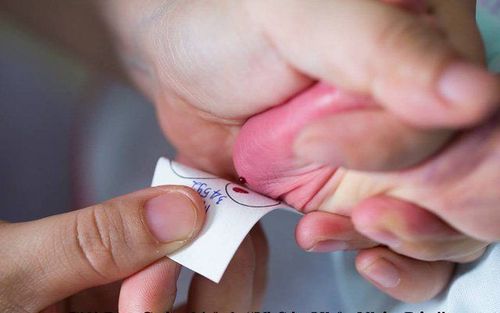This is an automatically translated article.
The article is professionally consulted by Master, Doctor Ngo Thi To Nga - Department of Pediatrics - Neonatology - Vinmec Nha Trang International General Hospital.Nutrition for babies in the period of 9 months is very important. At this time, besides breastfeeding, babies also need to eat a variety of 4 other food groups. Nutritional supplementation is of prime importance, but oral care in children cannot be ignored to prevent dental diseases.
1. Diet for 9-month-old children
During the first year, babies grow very quickly due to very high nutritional needs. On average, babies should be twice their birth weight at 6 months old and triple by 1 year old. So, what can a 9-month-old baby eat, what nutritional needs are that mothers are often concerned about.1.1. Nutritional needs of 9-month-old babies Glucid: The amount of glucose in a baby's diet can be changed by complementary foods and as the baby's energy needs change over time. Vitamin needs: Water-soluble vitamins, breast milk provides enough needs for babies if the mother has an adequate diet. Protein: Daily protein supplementation for 9-month-old babies is about 1.4g/kg to meet the development needs of bones, muscles and tissues. Lipids: Lipids play an essential role in the absorption of fat-soluble vitamins (A, D, E, K). The lipid requirements of a 9-month-old baby depend on the amount of fat present in breast milk and the amount of milk the baby sucks. Minerals: Calcium: about 400-600 mg/day; Iron: should add iron from iron-rich foods so that children can develop to the fullest extent; Zinc: helps children grow and develop the body's immune system.

9-month-old babies still need to breastfeed 3-4 times a day with an amount of about 650-850 ml. If your baby is taking less than 480 ml of formula per day, they need a daily vitamin D supplement. Children up to 9 months old should give them 3 full meals, from less to more so that the child can get used to it. At this time, breast milk is no longer rich in iron, so it is necessary to add more meat, but it is necessary to check each type of meat before adding it to the child's diet. Children should eat 1 type of meat a week, the amount of meat is about 3 tablespoons / 3 times / day. Whole milk should not be given to your baby until he is one year old. Juice is not necessary, but if giving it to your baby, it should not be more than 120-180 ml per day. You can add water to dilute it. Babies get enough water from breast milk or formula. However, with babies over 6 months old, they can drink water in a moderate amount when they are outside in the hot sun. Bottled baby food or homemade meats, vegetables, and pureed fruit can be offered to your baby. Or you can give your baby iron-fortified cereals once or twice a day. Your baby can start to try foods with different softness, hardness, and puree. At the same time, should add dark vegetables for children. Start with toast, cookies, bagels, small cereals, pasta, and soft foods. Avoid giving your baby foods high in fat, salt or sugar. Baby food does not need to be seasoned. Legumes, large pieces of fruit or vegetables, or sliced foods are very choking hazards. Do not force your baby to swallow every bite. Respect her decision when she refuses to eat and looks away. Let your baby fend for himself with a spoon. It is possible that food will spill on the floor, on the baby's body rather than in the mouth.

2. Dental care for 9-month-old children
In addition to the issue of what a 9-month-old child eats, mothers should also pay attention to the care of baby teeth, because milk teeth are very important for babies. Baby teeth will help your baby chew food and talk. If the mother does not take care of the baby's teeth, it is possible for a 9-month-old baby to have tooth decay.Some babies will start teething at 6 months of age, while others will erupt later or earlier. However, no matter what stage it is, as soon as a baby tooth has emerged, you need to clean it for your baby. Children should use a toothbrush designed specifically for children. You should brush your baby's teeth gently, focusing on the junction between the teeth and gums. If your child doesn't like brushing, give him a toothbrush so he feels he can do it. In case the baby does not cooperate, put your baby on the bed to brush his teeth. When your baby gets used to brushing his teeth, move on to the bathroom. Change your toothbrush every 3 to 4 weeks. If the bristles of the toothbrush are thrush, change them immediately, because a toothbrush with thrush will cause your baby's gums to scratch and bleed. In addition, the child should have oral health check-ups 1-2 times a year to prevent oral diseases such as tooth decay.
Trắc nghiệm: các chỉ số cần chú ý về sự phát triển thể chất của trẻ
Chiều cao, cân nặng của bé ở từng giai đoạn nên là bao nhiêu là bình thường, bao nhiêu là bất thường? Cùng ThS.BS Ma Văn Thấm điểm lại xem bạn đã nắm được các chỉ số phát triển thể chất của bé chưa nhé!The following content is prepared under supervision of Thạc sĩ, Bác sĩ y khoa, Ma Văn Thấm , Nhi , Phòng khám Đa khoa Quốc tế Vinmec Dương Đông(Phú Quốc)
3. Some other issues to note
Vaccinations: Normally, 9-month-old children have been vaccinated with vaccines: diphtheria - pertussis - tetanus - polio, HiB diseases, pneumococcal diseases, hepatitis B, influenza, measles. If the child is late for previous immunizations, the child will need additional immunizations. About emotions: 9-month-old babies will show stress, worry or cry when parents move away. Babies this age may already be able to sleep through the night, but may also wake up crying. Physically: 9-month-old babies can crawl, crawl and can pull themselves up and walk around tables and chairs. In addition, the baby can shake, hit and throw objects; Put your fingers in your mouth, make a fist, and can drink from a cup or point to objects.
Besides, parents also need to supplement their children with essential micro-minerals such as zinc, lysine, chromium, selenium, vitamin B1, ... to fully meet the nutritional needs of children. The addition of these essential vitamins also supports digestion, enhances nutrient absorption, improves anorexia, and helps children eat well. Parents can simultaneously apply dietary supplements and functional foods derived from nature for easy absorption. The most important thing is that improving your baby's symptoms often takes a long time. The combination of many types of functional foods at the same time or continuously changing many types in a short time can cause the baby's digestive system not to adapt and completely not good. Therefore, parents must be really patient with their children and regularly visit the website vimec.com to update useful baby care information.














